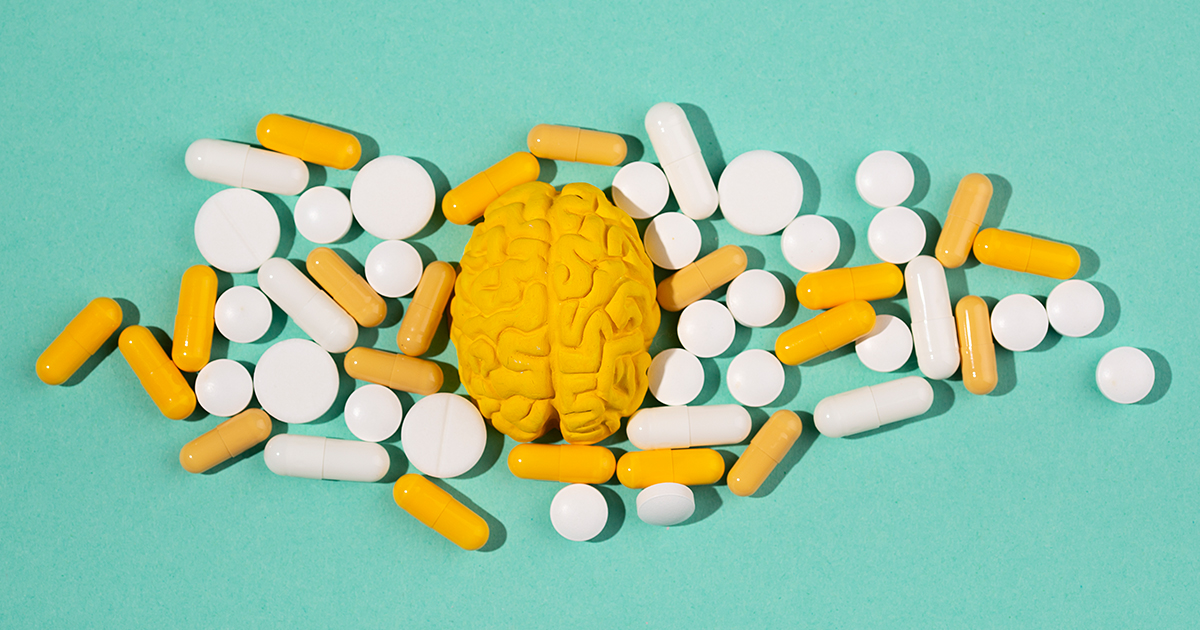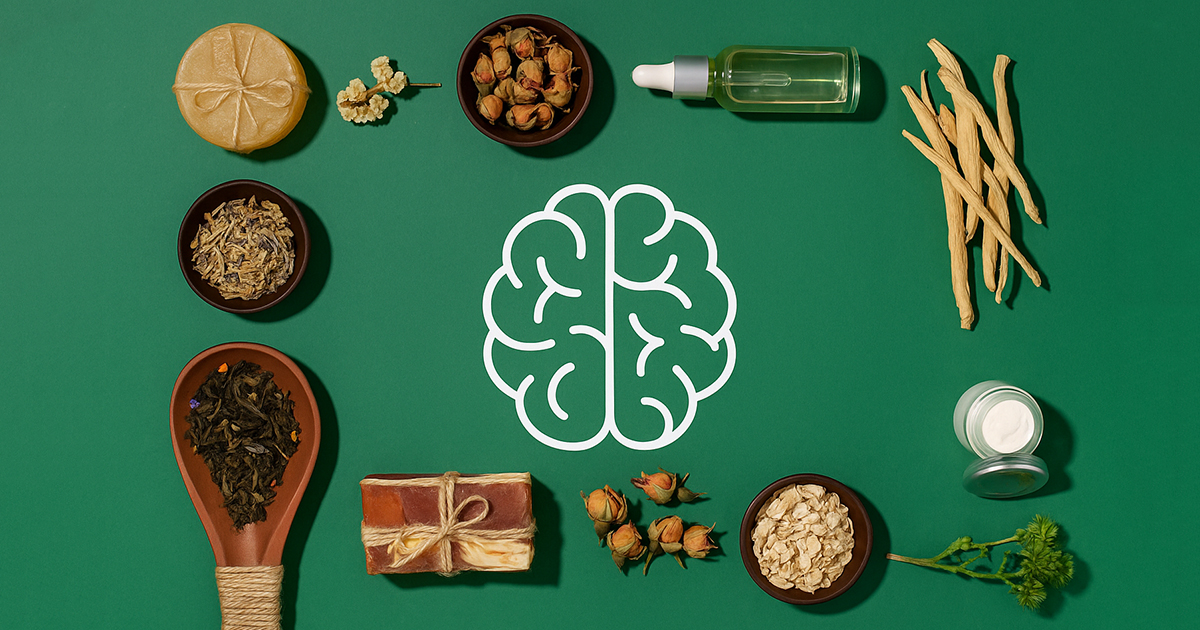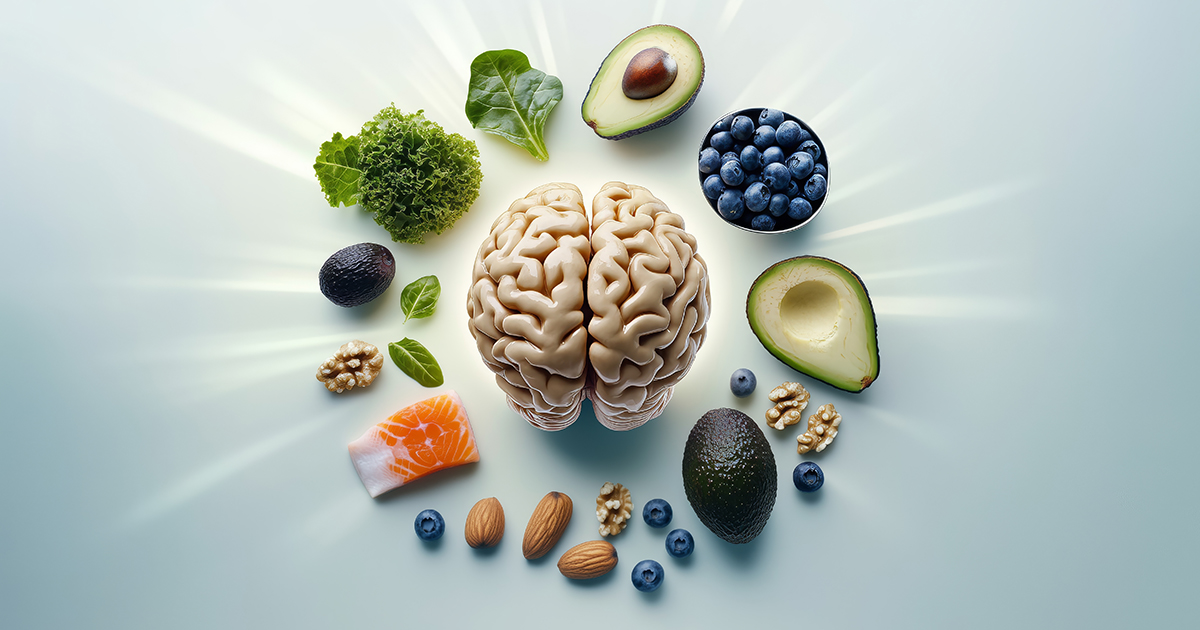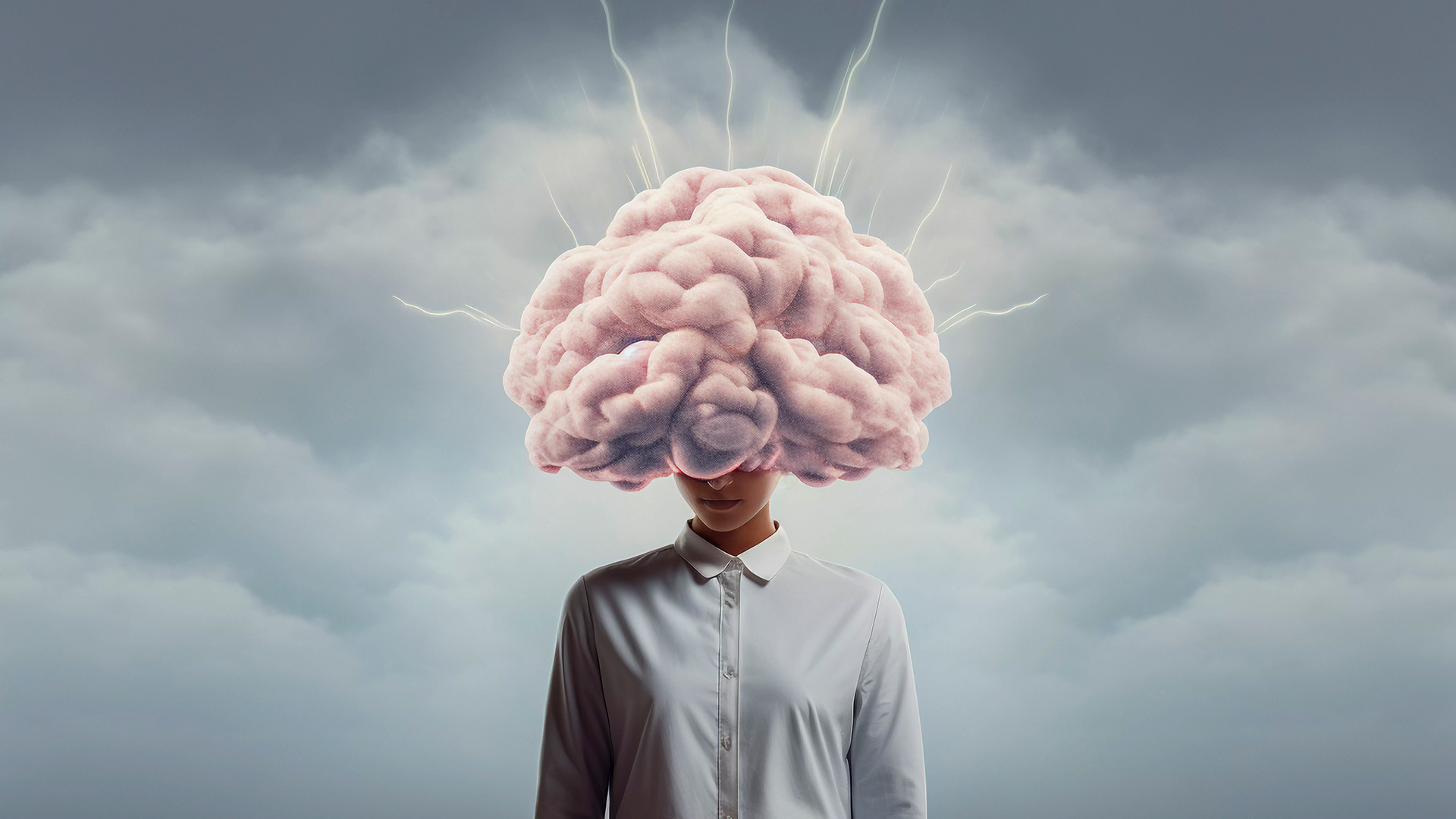Brain fog can be caused by stress, poor diet, lack of sleep, or even vitamin deficiencies. The good news? Certain vitamins can support brain health and help clear the mental haze. Key nutrients like Vitamin B12, Vitamin D, Vitamin B6, Vitamin C, and Omega-3 fatty acids are known to boost focus, memory, and overall mental clarity.
In this blog, we’ll explore how these vitamins work, where to find them, and how they may help you think more clearly and feel more energized.
What Does Brain Fog Mean?
Brain fog isn’t a medical diagnosis but rather a term used to describe a collection of symptoms that affect cognitive function. Understanding what brain fog means is the first step toward addressing it effectively.
What are the Common Symptoms of Brain Fog?
- Mental fatigue and feeling “cloudy”
- Difficulty concentrating on tasks
- Memory problems and forgetfulness
- Lack of mental clarity and focus
- Slow thinking and processing
- Feeling mentally “stuck” or confused
- Difficulty finding words during conversation
- Reduced productivity and motivation
What Causes Brain Fog?
Brain fog can result from various factors, often working in combination:
Nutritional Deficiencies
- Vitamin B12, D, and other essential nutrients
- Iron deficiency anemia
- Omega-3 fatty acid insufficiency
Lifestyle Factors
- Chronic stress and poor sleep quality
- Sedentary lifestyle and lack of exercise
- Dehydration and poor dietary choices
Medical Conditions
- Thyroid disorders and hormonal imbalances
- Autoimmune conditions and chronic inflammation
- Depression, anxiety, and other mental health issues
Environmental Factors
- Exposure to toxins and pollutants
- Medication side effects
- Chronic infections
What Vitamin Deficiency Causes Brain Fog?
Several vitamin deficiencies are strongly linked to brain fog symptoms. Identifying and addressing these deficiencies is crucial for restoring mental clarity.
1. Vitamin B12 Deficiency
Why It Matters: Vitamin B12 is essential for proper nerve function, DNA synthesis, and red blood cell formation. Deficiency can significantly impact cognitive function.
- Impairs myelin sheath production around nerves
- Reduces oxygen delivery to the brain
- Affects neurotransmitter synthesis
- Can cause memory problems and confusion
Signs of B12 Deficiency:
- Persistent fatigue and weakness
- Memory problems and difficulty concentrating
- Mood changes and irritability
- Tingling in hands and feet
- Pale skin and shortness of breath
Who’s at Risk:
- Vegetarians and vegans
- Adults over 50 (reduced absorption)
- People with digestive disorders
- Those taking certain medications (metformin, PPIs)
2. Vitamin D Deficiency
Can Lack of Vitamin D Cause Brain Fog? Absolutely. Vitamin D receptors are found throughout the brain, and deficiency can significantly impact cognitive function.
- Affects neurotransmitter production (serotonin, dopamine)
- Impacts brain cell growth and repair
- Influences the inflammation levels in the brain
- Affects sleep quality and mood regulation
Signs of Vitamin D Deficiency:
- Persistent fatigue and low energy
- Mood changes and seasonal depression
- Frequent infections and slow healing
- Bone and muscle pain
- Hair loss and skin problems
Risk Factors:
- Limited sun exposure
- Dark skin pigmentation in northern climates
- Older age (reduced skin synthesis)
- Obesity (vitamin D stored in fat tissue)
- Digestive disorders affecting absorption
3. B-Complex Vitamin Deficiencies
B1 (Thiamine) Deficiency:
- Affects glucose metabolism in the brain
- Can cause confusion and memory problems
- Often linked to alcohol consumption and poor diet
B6 (Pyridoxine) Deficiency:
- Essential for neurotransmitter synthesis
- Affects mood regulation and cognitive function
- Can cause irritability and confusion
B9 (Folate) Deficiency:
- Critical for DNA synthesis and repair
- Affects red blood cell production
- Can cause memory problems and depression
4. Iron Deficiency
While not a vitamin, iron deficiency is a common cause of brain fog:
- Reduces oxygen delivery to the brain
- Affects neurotransmitter production
- Can cause fatigue, poor concentration, and memory problems
Read also, Best Diet for Inflammation
What Vitamins Are Good for Brain Fog?

Now that we understand the deficiencies that cause brain fog, let’s explore what vitamins help with brain fog and how to use them effectively.
Essential Vitamins for Mental Clarity
1. Vitamin B12 (Methylcobalamin)
- Recommended Dosage: 1,000-5,000 mcg daily for deficiency correction.
- Best Form: Methylcobalamin or hydroxocobalamin (more bioavailable than cyanocobalamin)
- How to Take: Sublingual tablets or injections for better absorption
Food Sources:
- Grass-fed beef and organ meats
- Wild-caught fish (salmon, sardines, tuna)
- Eggs from pasture-raised chickens
- Nutritional yeast (fortified)
- Dairy products from grass-fed animals
2. Vitamin D3 (Cholecalciferol)
- Recommended Dosage: 2,000-5,000 IU daily (test levels first)
- Best Form: Vitamin D3 with K2 for optimal absorption
- How to Take: With fat-containing meals for better absorption
Natural Sources:
- Sunlight exposure (15-30 minutes daily)
- Fatty fish (mackerel, salmon, sardines)
- Egg yolks from pasture-raised chickens
- Mushrooms (UV-exposed varieties)
3. B-Complex Vitamins
Why Take a Complex: B vitamins work synergistically and are often depleted together
Key B Vitamins for Brain Health:
- B1 (Thiamine): 50-100 mg daily
- B6 (Pyridoxine): 25-50 mg daily
- B9 (Folate): 400-800 mcg daily (methylfolate form preferred)
- B12: As mentioned above
Benefits for Brain Fog:
- Support energy metabolism in brain cells
- Aid neurotransmitter synthesis
- Protect against oxidative stress
- Support healthy sleep patterns
Additional Nutrients That Combat Brain Fog
4. Omega-3 Fatty Acids
- Why They Help: Essential for brain structure and function
- Recommended Dosage: 1,000-2,000 mg combined EPA/DHA daily
- Best Sources: Wild-caught fish oil, algae oil (vegan option)
- Benefits:
- Reduce inflammation in the brain
- Support neurotransmitter function
- Improve memory and cognitive performance
- Protect against age-related cognitive decline
5. Magnesium
Brain Fog Connection: Involved in over 300 enzymatic reactions, including those affecting brain function
- Recommended Dosage: 200-400 mg daily
- Best Forms: Magnesium glycinate, citrate, or threonate
Benefits:
- Supports healthy sleep patterns
- Reduces stress and anxiety
- Improves focus and concentration
- Helps regulate neurotransmitters
6. Iron (When Deficient)
- Important Note: Only supplement iron if deficiency is confirmed through testing.
- Recommended Dosage: 18-25 mg daily (with vitamin C for absorption)
- Best Forms: Ferrous bisglycinate or ferrous fumarate
What Supplements Help with Brain Fog?

Beyond individual vitamins, certain supplement combinations and specialized nutrients can provide comprehensive brain fog support.
Comprehensive Brain Support Supplements
1. Adaptogenic Herbs: Take the following herbs:
Rhodiola Rosea
- Helps combat mental fatigue
- Improves stress resilience
- Enhances cognitive performance under stress
- Typical dosage: 200-400 mg daily
Ashwagandha
- Reduces cortisol levels and stress
- Improves focus and mental clarity
- Supports healthy sleep patterns
- Typical dosage: 300-600 mg daily
Ginkgo Biloba
- Improves blood flow to the brain
- Enhances memory and concentration
- Provides antioxidant protection
- Typical dosage: 120-240 mg daily
2. Nootropic Compounds
Phosphatidylserine
- Supports brain cell membrane health
- Improves memory and cognitive function
- Helps reduce mental fatigue
- Typical dosage: 100-300 mg daily
Acetyl-L-Carnitine
- Supports cellular energy production
- Crosses the blood-brain barrier
- May improve mental clarity and focus
- Typical dosage: 500-2,000 mg daily
Lion’s Mane Mushroom
- Supports nerve growth factor production
- May improve cognitive function
- Provides neuroprotective benefits
- Typical dosage: 500-1,000 mg daily
Targeted Supplement Protocols
For Chronic Fatigue-Related Brain Fog:
- Vitamin B12 (methylcobalamin): 1,000-5,000 mcg
- Vitamin D3: 2,000-4,000 IU
- Magnesium glycinate: 200-400 mg
- Rhodiola rosea: 200-400 mg
- CoQ10: 100-200 mg
For Stress-Related Brain Fog:
- B-complex vitamins: High-potency formula
- Magnesium: 300-400 mg
- Ashwagandha: 300-600 mg
- Omega-3 fatty acids: 1,000-2,000 mg
- L-theanine: 100-200 mg
For Age-Related Cognitive Decline:
- Vitamin D3 with K2: 2,000-4,000 IU
- Omega-3 fatty acids: 1,000-2,000 mg
- Phosphatidylserine: 100-300 mg
- Ginkgo biloba: 120-240 mg
- Acetyl-L-carnitine: 500-1,000 mg
What to Take for Brain Fog: Creating Your Protocol
Step 1: Test for Deficiencies
Before starting any supplement regimen, consider testing for:
- Vitamin B12 levels
- Vitamin D (25-OH) levels
- Complete blood count (for iron deficiency)
- Thyroid function (TSH, T3, T4)
- Inflammatory markers (CRP, ESR)
Step 2: Start with the Basics
- High-quality multivitamin with active B vitamins
- Vitamin D3 (2,000-4,000 IU daily)
- Omega-3 fatty acids (1,000-2,000 mg daily)
- Magnesium (200-400 mg daily)
Step 3: Add Targeted Support
Based on your specific symptoms and test results:
- For severe B12 deficiency: High-dose B12 supplementation
- For chronic stress: Adaptogenic herbs
- For poor sleep: Magnesium glycinate and melatonin
- For inflammation: Curcumin and omega-3s
Step 4: Monitor and Adjust
- Track symptoms and energy levels
- Retest nutrient levels after 3-6 months
- Adjust dosages based on response
- Work with a healthcare provider for optimal results
Lifestyle Factors That Enhance Vitamin Effectiveness

Vitamins work best when paired with healthy habits—your lifestyle choices can significantly boost how well your body absorbs and uses them.
Optimize Absorption
- Take with Food: Fat-soluble vitamins (A, D, E, K) need dietary fat for absorption
- Timing Matters: B vitamins are best taken in the morning; magnesium in the evening
- Avoid Interactions: Separate iron from calcium and zinc supplements
Support Overall Brain Health
- Quality Sleep: 7-9 hours of restorative sleep nightly
- Regular Exercise: Improves blood flow to the brain and nutrient delivery
- Stress Management: Chronic stress depletes B vitamins and affects absorption
- Hydration: Proper hydration is essential for nutrient transport
Dietary Considerations
Anti-Inflammatory Foods:
- Fatty fish rich in omega-3s
- Colorful vegetables and fruits
- Nuts and seeds
- Herbs and spices (turmeric, ginger)
Foods to Limit:
- Processed foods are high in sugar
- Excessive caffeine and alcohol
- Trans fats and refined oils
- Foods high in artificial additives
When to Seek Professional Help
Consult a Healthcare Provider If:
- Brain fog persists despite supplementation
- Symptoms worsen or new symptoms develop
- You have underlying health conditions
- You’re taking medications that may interact
- You experience severe fatigue or depression
Working with Functional Medicine Practitioners
Working with a functional medicine practitioner can help you get to the root cause of brain fog rather than just treating the symptoms. They take a personalized approach, looking at your diet, lifestyle, stress levels, and nutrient deficiencies to create a plan that supports your overall brain and body health.
Benefits of the Functional Medicine Approach:
- Comprehensive testing for root causes
- Personalized supplement protocols
- Integration of lifestyle modifications
- Monitoring of progress and adjustments
Conclusion
Brain fog doesn’t have to be a permanent part of your life. By understanding what vitamin deficiency causes brain fog and implementing targeted nutritional support, you can restore mental clarity and cognitive function.
Key Takeaways:
- Vitamin B12 and D deficiencies are common causes of brain fog
- B-complex vitamins work synergistically to support brain health
- Omega-3 fatty acids and magnesium provide additional cognitive support
- Testing for deficiencies helps create targeted protocols
- Lifestyle factors significantly impact supplement effectiveness
Remember that addressing brain fog often requires a comprehensive approach combining proper nutrition, targeted supplementation, lifestyle modifications, and sometimes professional guidance. Be patient with the process – nutritional healing takes time, but the results are worth the investment in your cognitive health.

